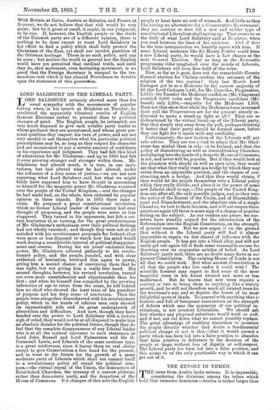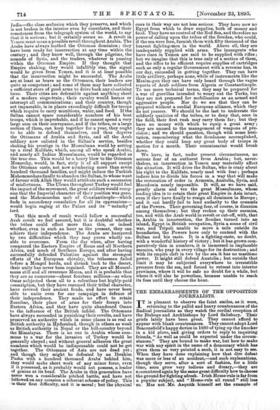THE REVOLT IN YEMEN. T HE news from Arabia looks serious.
It is impossible, considering the divisions among the tribes which hold that immense dominion—Arabia is rather larger than India—the close seclusion which they preserve, and which is not broken in the interior even by consulates, and their remoteness from the telegraph system of the world, to say that it is serious ; but it certainly seems so. A revolt in Yemen must mean a possible revolt throughout Arabia. The Arabs have always loathed the Ottoman dominion ; they have been ready for insurrection at any time within the century ; and they know well, through the pilgrims, the nomads of Syria, and the traders, whatever is passing within the Ottoman Empire. If they thought that Empire shaking, they would infallibly rise, the signal would be given from Yemen, and it is at least possible that the insurrection might be successful. The Arabs are at least as brave as the Ottomans, their leaders are quite as competent ; and some of them may have collected a sufficient store of good arms to drive back any chastising force. Their cities are defensible against anything short of a modern siege-train ; their cavalry would harass or intercept all communications ; and their country, though not impassable, is in places exceedingly difficult for troops which require to carry munitions, water, and food. If the Sultan cannot spare considerable numbers of his best troops, which is improbable, and if he cannot spend a very large sum on their conveyance, and if the tribes, or a large section of them, can keep together for a year, they ought to be able to defend themselves, and thus deprive the Ottomans of Arabia and Syria, and all the Arab soldiery now enlisted in the Sultan's service, besides shaking his prestige in the Mussulman world by setting up a rival Kalifate, which, among all who speak Arabic, and nearly all Indian Mussulmans, would be regarded as the true one. This would be a heavy blow to the Ottoman Monarchy, would, in fact, strip it of all support except the Ottoman caste, not now numbering more than seven hundred thousand families, and might induce the Turkish Mahommedans v to abandon the Sultan, to whose want of favour with Allah they would attribute such a succession of misfortunes. The Ulema throughout Turkey would feel the impact of the movement, the great soldiers would recog- nise that the Imperial character of their position was gone, and the Mahommedan mob of Constantinople—which finds in ascendency consolation for all its oppressions— would begin raging at the Palace and its " unlucky " lord.
That this much of result would follow a successful Arab revolt we feel assured, but it is doubtful whether the tribes could effect more than this, or indeed whether, even in such an hour as the present, they can achieve their independence. The Arabs are hampered by two difficulties which they may prove wholly un- able to overcome. From the day when, after having conqnered the Eastern Empire of Rome and all Northern Africa, and much of Southern Europe, and after having successfully defended Palestine against the strongest efforts of the European chivalry, the tribesmen failed before a Mongol horde, and shrank back to the desert, their unity has never been regained. They are all Mussul- mans still and all reverence Mecca, and it is probable that they are as numerous—about fourteen millions—as when Omar subjected them all to a relentless but highly-paid conscription, but they have resumed their tribal character, have revived their ancient feuds, and have never been able to unite even for one campaign in defence of their independence. They made no effort to retain Zanzibar, their place of arms for their forays into Eastern Africa, and they have quite abandoned Oman to the influence of the British infidel. The Ottomans have always succeeded in punishing their revolts, and have preserved an authority which in some places is as real as British authority in Hyderabad, though in others as weak as British authority in Nepal or the hill-country beyond the Himalayas. There is no one in Arabia whose sum- mons to a war for the invasion of Turkey would be generally obeyed; and without general adhesion the great numbers which would be indispensable could not be got together. The Ottomans of Asia are not dead yet ; and, though they might be defeated by an Ibrahim Pasha with a hundred thousand Arabs behind him, they would make short work of any minor force, even if it possessed, as it probably would not possess, a leader of genius at its head; The Arabs in this generation have never won a considerable pitched battle, and have not followed on any occasion a coherent scheme of policy. This is their first difficulty, and it is moral ; but the physical ones in their way are not less serious. They have now no Egypt from which to draw supplies, both of money and food. They have no control of the Red Sea, and therefore no power of calling upon the tribes of the Soudan, who could, if the sea were free, furnish them with fifty thousand of the bravest fighting-men in the world. Above all, they are inadequately supplied with arms. The insurgents who have risen in Yemen are said to be supplied with rifles ; but we imagine that this is true only of a section of them, and the rifles to be efficient require supplies of cartridges such as only a regular Government with a revenue has, in our day, succeeded in getting together. They can have little artillery, perhaps none, while of instruments like the Maxim-gun they can have only heard through the vague reports of Arab soldiers from Algeria or Constantinople. To use more technical terms, they may be prepared for a war of guerillas intended to weary out the Turks, but they are not prepared for mobilisation as an armed and aggressive people. Nor do we see that they can be prepared without a cordial European alliance, which they do not possess. We should be the last to underrate the soldierly qualities of the tribes, or to deny that, once in the field, their first rush may carry them far ; but they have no money with which to equip a great army ; they are unused to the management of weapons of pre- cision; and we should question, though with some hesi- tation, remembering what the Soudanese accomplished, whether they could keep any great body of troops in motion for a month. Their commissariat would break down.
We have, in fact, under present circumstances, no serious fear of an outburst from Arabia ; but, never- theless, an insurrection in Yemen may materially affect the situation. It will drive the Sultan, who is crazy about his right to the Kalifate, nearly mad with fear ; perhaps induce him to divide his forces in a way that will make the restoration of order in Armenia, Anatolia, Syria, and Macedonia nearly impossible. It will, as we have said, greatly alarm and vex the great Mussulmans, whose leading idea is to retain their great Empire in Asia intact, even if they have finally to resign all dominion in Europe ; and it can hardly fail to lend audacity to the counsels of the Powers. Their governing fear, of course, is disunion among themselves ; but they reckon up their enemies, too, and with the Arab world in revolt or cut-off, with, that is, Arabia in insurrection, the Soudan turned into an island, Egypt in British occupation, Syria a scene of civil war, and Tripoli unable to move a mile outside its boundaries, the Powers have only to contend with the Sultan and his caste. It is a fighting-caste, no doubt, with a wonderful history of victory ; but it has grown com- paratively thin in numbers, it is immersed in implacable enemies, who pray in every village for its destruction ; and with its empire cleft in two by the sea it has no maritime power. It might still defend Anatolia ; but outside that limit it may be subjected everywhere to irresistible pressure from the sea, and forced to retreat into interior provinces, where it will be safe no doubt for a while, but where it will also be powerless, because unable to reach its foes until they choose the hour.











































 Previous page
Previous page